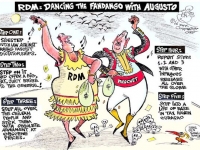Pinochet's Dutch Secret

The Rotterdam housing project for retired RDM employees looks like a late 19th century impressionist painting. Located near the world's largest shipyards, the Heyplaat district is a peaceful place: the streets are tree-lined and filled with singing birds; elderly women knit in the shade of trees while the men gather in clubhouses to shoot pool.
The elderly residents are some of the 5,000 people who used to work for Rotterdamse Droogdok Maatschappij (Rotterdam Drydock Company or RDM). They are the lucky ones who reached retirement age while the company was still viable. Thousands more were laid off when RMD went belly up in 2004. At its height the company was worth over two billion dollars on paper, and its head, Joep van den Nieuwenhuyzen, was called a financial magician--or the company-doctor--because of his knack for buying defunct companies, nursing them back to financial health, and then selling them for a large profit.
Later this summer, however, Nieuwenhuyzen will go on trial for driving RDM into bankruptcy.
Nieuwenhuyzen too, lives in beautiful surroundings in the shade of trees. But his trees are the evergreens that dot Switzerland, where he keeps his mountain-top residence, and the palms that sway in the breezes of Curaçao, the largest of the Dutch Antilles islands in the Caribbean.
"Anyone who wants a permanent residence on this island has to have a household staff of at least three locals," he advises CorpWatch, a rum and Coca-Cola close at hand.
Nieuwenhuyzen is one of Curaçao's tax exiles. They have a choice: either pay five percent of their worldwide income or ante up 30,000 Euros (about $38,215). Nieuwenhuyzen, with an estimated net worth of 3.1 billion Euros (almost $4 billion), is surely choosing to pay the fixed amount.
Nieuwenhuyzen's easy impunity infuriates Cindy de la Fuente. An attorney at Halley, Blaauw and Navarro in Willemstad, Curaçao, she says that Nieuwenhuyzen owes $3.2 million to her client, IBCOL, a German helicopter distributor.
IBCOL is just one of the many angry business associates charging that Nieuwenhuyzen cut them a bad deal. Another is Chile's police force, which is investigating bribes paid out by their former military dictatorship and finding that the trail of evidence leads to the Dutch magician.
Scrap Dealer to Arms Trader
Nieuwenhuyzen started his career as a scrap dealer. He graduated to buying and selling defunct companies via the Begeman corporation. From Brazil to India, from Russia to South Korea and Malaysia, he would buy and restructure businesses and sell them at enormous profits, often leaving scores of employees empty-handed.
In 1995 Begeman was declared bankrupt and it was at this point that Nieuwenhuyzen took over RDM, a Dutch company that dates back to the 1920s when it built and sold submarines--a company that had also fallen on hard times. The government sold it to him for just over $20 million; but he realized that he could use it to make even bigger business deals because of its history and reputation.
RDM was a key part of a major Dutch arms production system that manufactures warships, electronics, munitions and spare parts for aircrafts--all exports heavily supported by the government. Indeed, for a country that is not involved in major military operations, the Netherlands ranks an astonishing number seven on the world list of arms exporting countries.
Nieuwenhuyzen quickly expanded RDM's military trading operation of RDM--he sold guns for armored cars worth more than a million dollars each to Jordan and had firm orders for other weapons from countries including Austria, Canada, Norway and the United Arab Emirates.
Dutch Arms Trade Today The Netherlands is the seventh largest arms exporting country in the world. Critics have charged that the Netherlands is profiting from arms trade with countries likely to use the weaponry to violate human rights. |
Then things started to come unstuck for Nieuwenhuyzen. His deals for the Moray class submarine with Chile, Israel, South Africa and Thailand sank. A deal with Lockheed Martin to build its Joint Strike Fighter's tow bar (the mechanism that halts the fighter jet when it lands on board an aircraft carrier) never took off.
Doing Business with Pinochet
A deal with Chile clearly reveals how Nieuwenhuyzen made some of his money. On September 11, 1973, when General Pinochet seized power from Chile's leftists, the Netherlands' socialist government cut almost all ties with the new fascist regime. The Hague's policy at the time was to ban all weapons sales to Santiago.
Unknown to the general public, however, in 1995, two ambitious Dutch bureaucrats met secretly with Chilean army officers in Santiago and offered them 202 Leopard 1V tanks at $50,000 a piece, not including munitions and spare parts.
Boukje Boukens, a retired RDM staff member in Heyplaat, who lives in one of RDM's apartments for former employees, recalls the deal. He is a stocky older man who worked in the company's social affairs department.
He face wrinkles up as he tells CorpWatch the story: "They were invited by the Chilean Army brass directly under Pinochet, who now is being charged and exposed as one of the big global players in fraud, money laundering, and [as] a corrupt arms-dealer."
Since the ban was still in place and the two Dutch officials were not authorized to close the deal, the tanks were sold to Nieuwenhuyzen's RDM for the ridiculously low price of $18,500 each. They were booked as scrap metal.
Nieuwenhuyzen's company then turned to Pedro del Fierro, a consultant and dealer who was on Interpol's wanted list for selling and delivering arms to Croatia. He is also a former secret service general from the Chilean Army, who has been accused of countless killings, disappearances and torturing.
On behalf of RDM, del Fierro offered the very same tanks to the very same top Chilean army officials, to be delivered to FAMAE (Fabrica y Maestranzas del Ejercito de Chile), the arms purchasing department of the Chilean army.
"Justice authorities in Santiago discovered documents showing Pinochet's plans to do business with RDM and not with the Dutch government as, it had condemned his September 11th coup, killing so many people and overthrowing a socialist experiment," says Evert van der Schee, another retired RDM employee. He is a former member of the RDM employee union who has written a book about the episode.
At the time, Dutch Defense Minister Joris Voorhoeve liked to think that RDM had the deal of a lifetime. In a letter dated October 29, 1997 that he sent to his colleague, Foreign Affairs Secretary Hans van Mierlo, he welcomed RDM's business plan: "The government wins in this construction because direct negotiations between us and the Chileans can be avoided."
The idea of selling and delivering tanks to the Pinochet regime was sensitive to the Dutch government, which had not forgotten the pictures of the September 11, 1973 Santiago siege, when tanks had destroyed the city centers.
Secretary Van Mierlo notes that there was one condition for the deal: "Defense wanted to get rid of the military equipment. We accepted the Chilean government deal after he (the General Pinochet) had stepped down as commander-in-chief. I think that after all I now think we should not have permitted business with Chile at all."
But Van der Schee points out that this was not a mistake on part of the Chileans. "We now know that Pinochet never took the Dutch government seriously and he needed RDM to get his bribes. He would never get those bribes from the government in the Hague," he tells CorpWatch.
"Although we at RDM paid a huge amount of money in bribes, we made a fortune selling those tanks at $77 million. We always paid a commission. That is common practice. Altogether we paid $9 million to Chilean army officials and their associates to close the deal," he said.
There is more. "Before the contracts were signed, another consultant [Oscar Aitken] called RDM identifying himself as General Pinochet's personal advisor," says Boukens. RDM checked to make sure he was really representing Pinochet, and then paid out another three percent of the insurance value--or almost $2 million.
The payment was made by a Dutch Antillean company, RDM Holding NV (another Nieuwenhuyzen company), to Cornwall Overseas Corporation, a trust run by Aitken, which was used to pay the secretary and personal advisor to General Pinochet. A second general was paid off through Eastview Finance, an offshore business of General Augusto Pinochet.
Interestingly, Dutch parliamentary and public records show that the Leopard tanks were sold to RDM Technology Holding BV, a tax shelter in the Dutch Antilles. Still, the deal was technically legal because at that time, paying bribes to foreign bureaucrats was a legitimate business expense. Bribery has since been made illegal.
Trials of a Tax Exile
Today Nieuwenhuyzen spends most of his time on an airplane traveling between Africa, Europe, South and North America, and the Far East checking in at international airports at least once a week, as he works his complicated business deals and lives off the proceeds.
He stops occasionally in Amsterdam where he stays at the Amstel hotel. "It's an exceptionally warm and friendly place where they have a special suite and wardrobe for me with my name printed on a housecoat," he says. Indeed he boasts, he has more wardrobes in other five star hotels and places around the globe.
"The taxman does not allow me to have a residence in my own country, but they don't want to prohibit my stay," he adds.
Back in Rotterdam, sitting under shady trees on a hot day in Heyplaat, a few RDM retirees learn that their former boss paid a $9 million bribe to the Pinochet regime in Chile. Wiping sweat from their foreheads, they say that the high temperature this summer is nothing compared to what Nieuwenhuyzen will experience at the trial. "It's going to be hotter than hell," one warned.
July 25, 2006 news update: Joep van den Nieuwenhuyzen currently faces multiple lawsuits over his business practices.
One of the first to go to trial was the bankruptcy of SP Aerospace, a company which built and repaired Fennek-armored vehicles for the Dutch Department of Defense, but went bust in 2004.
In late July 2006, a Rotterdam judge ruled that Nieuwenhuyzen deposited several million euros from SP Aerospace into another of his Curaçao-based companies. He ordered the controversial businessman to pay the curator of SP Aerospace back the sum of 12 million Euros (a little over US$ 15 million).
"He is guilty of bankrupting his companies on purpose and with the only goal of enriching himself. He deliberately short-changed and harmed his creditors," the judge said.
Nieuwenhuyzen plans to appeal the verdict while awaiting other trials.



